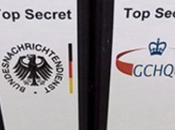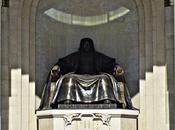Magazine Società
Si è in attesa delle nuove sanzioni dell'UE, che molto probabilmente come già accaduto, ricalcheranno quelle degli americani. Questa è stata definita la "Fase 2" delle disposizioni: la "Fase 3", prevede azioni molto più pesanti, mirate all'apparato economico e commerciale. Secondo la maggior parte degli osservatori, tali provvedimenti saranno minacciati, ma difficilmente si arriverà al punto di applicarli.
Quello che invece è in discussione tra i leader europei, è la possibilità di creare una strategia comune che svincoli i propri paesi dalla dipendenza energetica russa: se n'era già parlato dopo le vicende della Georgia nel 2008, che questa sia la volta buona?
Nel frattempo da Mosca fanno sapere che anche il governo russo sta disponendo sanzioni verso alcuni politici americani, tra questi Harry Reid, John Boehner e John McCain, nonché uno dei consiglieri per la sicurezza nazionale del presidente Obama, Benjamin Rhodes. Bohener ha già commentato di essere «orgoglioso» dell'inserimento del suo nome nelle sanzioni russe.
I nomi dei sanzionati, così come riportati dal Dep of Treasury.
Viktor Ozerov is the Chairman of the Security and Defense Committee of the Federation Council of the Russian Federation. On March 1, 2014, Ozerov supported Russian President Vladimir Putin’s appeal regarding the use of the Russian Armed Forces in Ukraine.
Vladimir Dzhabarov is the First Deputy Chairman of the International Affairs Committee of the Federation Council of the Russian Federation. On March 1, 2014, Dzhabarov supported the Putin’s appeal regarding the use of the Russian Armed Forces in Ukraine.
Evgeni Bushmin is the Deputy Speaker of the Federation Council of the Russian Federation. On March 1, 2014, Bushmin publicly supported the deployment of Russian forces in Ukraine.
Nikolai Ryzhkov is a Senator in the Russian Upper House of Parliament (Federation Council). Ryzhkov publicly supported the deployment of Russian forces in Ukraine.
Sergei Zheleznyak is the Deputy Speaker of the State Duma of the Russian Federation.
Sergei Mironov is a Member of the Council of the State Duma, a Member of the State Duma Committee on Housing Policy and Housing and Communal Services, and Leader of the Fair Russia Faction in the Duma of the Russian Federation.
Aleksandr Totoonov is a Member of the Committee on Culture, Science, and Information, Federation Council of the Russian Federation. On March 1, 2014, Totoonov publicly supported the deployment of Russian forces in Ukraine.
Oleg Panteleev is the First Deputy Chairman of the Committee on Parliamentary Issues. On March 1, 2014, Panteleev publicly supported the deployment of Russian forces in Ukraine.
Sergey Naryshkin has been the Chairman of the Government Duma of the Federal Gathering of the Russian Federation since December, 2011. Additionally, he is a member of the National Security Council of the Russian Federation and of the United Russia party.
Victor Ivanov has been director of the Federal Drug Control Service (FSKN) of the Russian Federation since May 15, 2008; he was appointed as a member of the Security Council of the Russian Federation on May 25, 2008. Ivanov has served in a number of other government positions prior to that; he was Assistant to the President of the Russian Federation from 2004 - 2008; and Deputy Chief of the Administration of the Russian Federation from 2000 - 2004. Ivanov joined the KGB in 1977 and eventually rose to become the Deputy Director of the Federal Security Service. Ivanov is a close ally of Putin and served alongside Putin as the chief of staff of the St. Petersburg Mayor’s office in 1994 when Putin was first deputy head of the city’s administration.
Igor Sergun is the head of Russia’s military intelligence service (GRU) and is Deputy Chief of the General Staff.
Sergei Ivanov is the Chief of Staff of the Presidential Executive Office.
Alexei Gromov is the First Deputy Chief of Staff of the Presidential Executive Office.
Andrei Fursenko is an aide to the President of the Russian Federation and has been in that position since May 21, 2012. Fursenko has held a number of positions in the Government of the Russian Federation since 2001, including Minister of Education and Science from 2004 - 2012. Although not being designated for being a member of the Russian leadership’s inner circle, Fursenko first met Putin in 1993 and they remain closely associated.
Vladimir Yakunin was appointed as chairman of the board of the Russian state-owned company Russian Railways on June 15, 2005; he has remained as head of the company ever since. Yakunin is being designated because of his official position in the Russian government, but he is also a close confidant of Putin. Yakunin regularly consults with Putin on issues regarding the Russian Railways company. In addition, Yakunin accompanies Putin on many domestic and international visits. Yakunin met Putin while both were working in St. Petersburg. Yakunin decided to create a business center in the city and contacted Putin for his support. In addition, Yakunin became a member of the board of the Baltic Maritime Steamship Company on Putin’s instructions. Yakunin and Putin were also neighbors in the elite dacha community on the shore of Lake Komsomolsk and they served as cofounders of the Ozero Dacha Cooperative in November 1996.
Vladimir Kozhin was appointed the Head of Administration under the President of the Russian Federation by Putin on January 21, 2000. He has served continuously in that position until the present time. Kohzin is responsible for overseeing a staff of 60,000, over a hundred enterprises and institutions including the Kremlin and several other government buildings, and over four thousand vehicles. Kohzin’s positions have been variously referred to as Head of Administration, Head of the Presidential Affairs Office, Head of the Presidential Business Management Directorate of the Russian Federation, and head of the Presidential Property Management Directorate.
Members of the Inner Circle
Arkady Rotenberg and Boris Rotenberg have provided support to Putin’s pet projects by receiving and executing high price contracts for the Sochi Olympic Games and state-controlled Gazprom. They have made billions of dollars in contracts for Gazprom and the Sochi Winter Olympics awarded to them by Putin. Both brothers have amassed enormous amounts of wealth during the years of Putin’s rule in Russia. The Rotenberg brothers received approximately $7 billion in contracts for the Sochi Olympic Games and their personal wealth has increased by $2.5 billion in the last two years alone.
Yuri Kovalchuk is the largest single shareholder of Bank Rossiya and is also the personal banker for senior officials of the Russian Federation including Putin. Kovalchuk is a close advisor to President Putin and has been referred to as one of his “cashiers.”
Possono interessarti anche questi articoli :
-
Analisi d’intelligence: criticità e benefici del sistema di spionaggio e...
Print PDFdi Alessandro ContinielloIn questo periodo storico, alla luce dei tragici accadimenti francesi, i sistemi d’informazione e sicurezza di tutti i Paesi... Leggere il seguito
Da Bloglobal
OPINIONI, POLITICA, POLITICA INTERNAZIONALE, SOCIETÀ -
Al bar
Più che un bar sembra un convivio di saggi, almeno la prima impressione che dà è quella. L’insegna, d’altronde, reca il titolo di un’opera di Platone: la... Leggere il seguito
Da Malvino
SOCIETÀ -
L'odore dell'escalation al mattino
(Uscito sul Giornale dell'Umbria)Qualche settimana fa la Reuters pubblicava un'inchiesta fatta dai suoi giornalisti in Ucraina. Leggere il seguito
Da Danemblog
SOCIETÀ -
Il Gesuitico Renato Ruggiero e l'OMC
Renato Ruggiero (Napoli, 9 aprile 1930 – Milano, 4 agosto 2013) è stato un diplomatico e politico italiano, che, dopo aver raggiunto i massimi gradi della... Leggere il seguito
Da Nwotruthresearch
ATTUALITÀ, SOCIETÀ -
Ue-Russia, il peso economico delle sanzioni
Che le sanzioni dell’Ue alla Russia provochino una perdita in termini economici a tutti gli attori coinvolti è circostanza risaputa, meno conosciute sono le... Leggere il seguito
Da Fabio1983
SOCIETÀ -
I monumenti di Ulaanbaatar, camminando tra la storia mongola
Gengis KhanLa Mongolia è un paese meraviglioso, dalle terre sconfinate e dal cielo blu, soprattutto a giugno, come è difficile vedere in altre parti del mondo. Leggere il seguito
Da Pietro Acquistapace
POLITICA INTERNAZIONALE, SOCIETÀ




